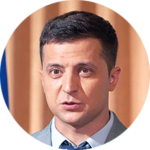Editor’s Note: On Feb. 26, Ukraine’s Constitutional Court issued a ruling declaring that a 2015 law against unlawful enrichment unconstitutionally shifts the burden of proof to the defendant. The ruling brought an end to at least 65 active criminal investigations under the statute, provoking criticism from anti-corruption activists and others, who allege that the ruling will derail efforts to prosecute embezzlement and graft.

“Now, through the Constitutional Court, they are starting to adjust the Criminal Code of Ukraine, in order to avoid jail for their corruption on the blood (of Ukrainian soldiers). And this is the true face of the president.”
— presidential candidate and former Prime Minister Yulia Tymoshenko.

“After it boldly/demonstratively came to the defense of corrupt officials, the Constitutional Court has lost its legitimacy in society, and thus no longer has a right to exist… After this shameful act by Constitutional Court judges against the people, the only path is a shutdown and a total reset (of the court).”
— presidential candidate and former Defense Minister Anatoliy Grytsenko

“Step by step, the authorities are nullifying Ukraine’s institutional accomplishments, which were achieved in the first years after Maidan — laying flowers on Instytutska Street in front of the cameras and then quietly tearing to pieces that which Ukrainians died for (during the EuroMaidan Revolution). This is beyond cynicism. I am already not saying that this step is simply deception. After all, this article of the Criminal Code requiring public figures to explain the origins of their property…was one of the demands in (Ukraine’s) process for receiving a visa-free regime with the European Union.”
— presidential candidate and Lviv Mayor Andriy Sadovyi

“The continued existence of (the Constitutional Court) in our governance system is demonstrative raider attacks on our statehood.”
— lawmaker Hanna Hopko, chair of the Verkhovna Rada’s foreign affairs committee.

“I have given notice that I am leaving the Petro Poroshenko Bloc party. This is a formality. We have already been on different sides of the values divide for a long time. Recent events have only confirmed this. I entered politics after the (EuroMaidan) Revolution and I don’t want to be tied, even formally, to those who are leading the counterrevolution.”
— lawmaker Mustafa Nayyem

“It will be impossible to bring (anyone) to justice for everything that the authorities stole in the last five years… There are many candidates, but one of them, undoubtedly, will go to prison.”
— actor and presidential candidate Volodymyr Zelenskiy, referring to President Poroshenko

“We should focus not on attacking the Constitutional Court, but on passing in the Verkhovna Rada, as quickly as possible, a new edition of the (law) on unlawful enrichment in accordance with the Constitution and international norms. The campaign hurricane is temporary, but the most important thing is not to leave ruins in its wake.”
— lawmaker Volodymyr Ariev, a vice president of the Council of Europe’s Parliamentary Assembly

“This is the third time in my life when the Constitutional Court has passed an absolutely shameful ruling for the incumbent president. In far-off 2003, the court allowed (President Leonid) Kuchma to run for a third term. In 2010, the court granted (President Viktor) Yanukovych additional powers… And now, in 2019, a month before he may lose power, Poroshenko has decided to take out an insurance policy: the court canceled the law on unlawful enrichment.”
—lawmaker Sergii Leshchenko

“This is a disaster in terms of (the) future of anti-corruption effort and raises (a) huge question mark about future cooperation with the International Monetary Fund.”
— economist Timothy Ash

“People from different political forces united in this appeal (to the Constitutional Court). The threat is common. For many lawmakers who have, let’s say, ‘unofficial income’ there is a potential risk of investigation for unlawful enrichment. As a result, they decided to undermine the foundation, to leave these investigations without a legal foundation. Unfortunately, there are many people for whom this is beneficial — in the Verkhovna Rada and among the officials and influential people.”
— political analyst Volodymyr Fesenko

“It is not clear if this ruling has any immediate implications for Ukraine’s ongoing aid programs with the IMF and the EU, but it is obviously not passing unnoticed and, if not rectified, may at least entail stricter lending conditionality going forward… We should also note that a number of legal experts, including opposition deputies on parliament’s anti-corruption committee, have long pointed out that the canceled anti-corruption provision was effectively not enforceable and had to be changed. Still, this does not change the fact that the National Anti-Corruption Bureau now has to stop investigating and close its 65 illicit enrichment cases against top officials, a new law on the matter would come into force in mid‑2019 at best, the recently launched system of e-declarations for state officials has been compromised as an anti-corruption tool, and, as we understand, the assets declared to date have effectively been amnestied and cannot be probed.”
— Dragon Capital, Ukraine’s largest investment firm

“In one fell swoop, the Constitutional Court rescued dozens of high-ranking officials from corruption investigations and possible prosecutions under a new president. The critics’ claims are credible that the court reached its ruling at the behest of the president. In the context of the election campaign, this is a reward for the loyalty of the president’s political team that faced corruption charges, including Lutsenko, who has made a dramatic transition from his days as a political prisoner and EuroMaidan activist…This development adds to the mounting speculation that Poroshenko and his entourage are making preparations for their departure from office… However, we are confident that Poroshenko will go to extremes before surrendering the presidency.”
— Zenon Zawada, political analyst at Concorde Capital investment firm
